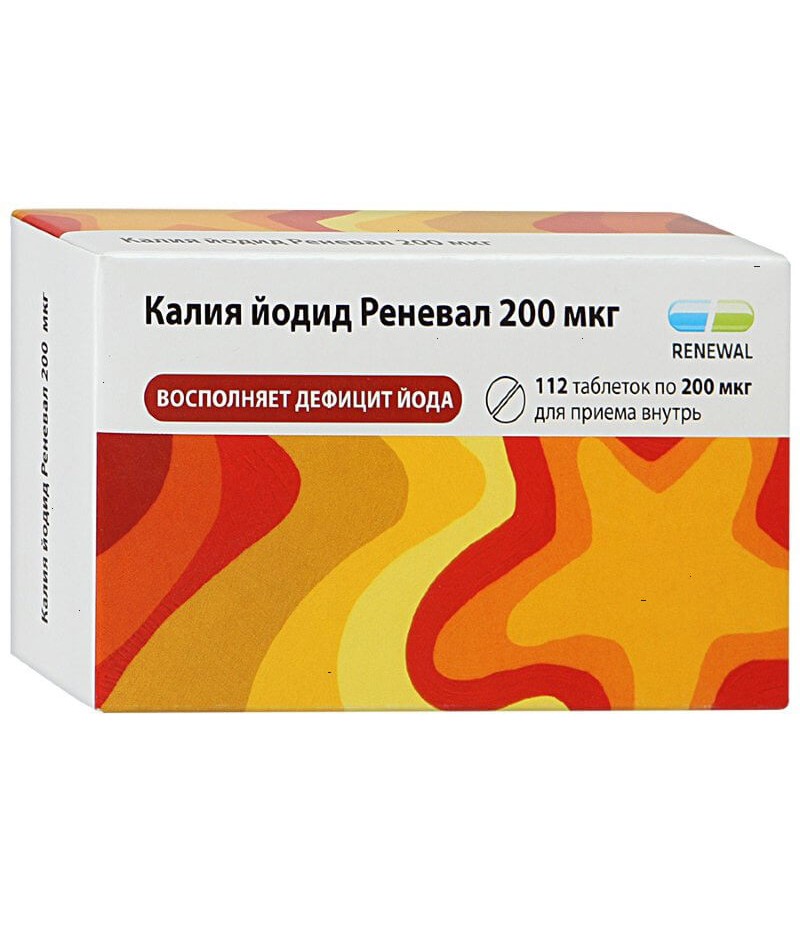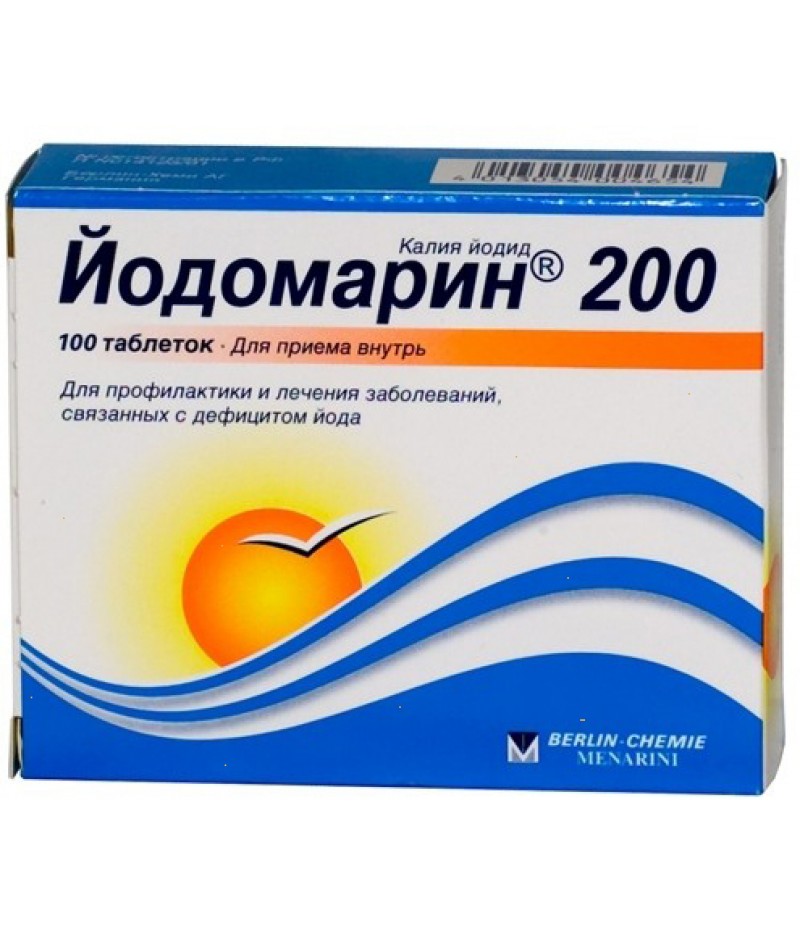Potassium iodide tabs 200mcg #112
- $5.82
- 3 or more $5.70
- Availability:In Stock
Potassium iodide user manualReed more and buy Potassium iodide on this pageCompositionThe formula of potassium iodide is KI. One tablet of potassium iodide may contain 100 or 200 μg of active substance. Drops for the eyes - a solu..
Tags: tabs
Potassium iodide user manual
Reed more and buy Potassium iodide on this page
Composition
The formula of potassium iodide is KI. One tablet of potassium iodide may contain 100 or 200 μg of active substance. Drops for the eyes - a solution that contains 3% of the active substance. Potassium iodide solution can contain a different amount of active substance - 0.25%, 10-20%.
Form of issue
Manufacturers produce tablets, drops, as well as a solution of potassium iodide. Tablets are placed in cans of orange glass. A solution of potassium iodide 3% is packaged in 200 ml vials. Drops for the eyes are realized in 10 ml vials.
pharmachologic effect
The pharmacopeia indicates that the drug has an effect on thyroid function, affecting, in particular, the process of formation of hormones. It stops the production of thyroid-stimulating hormone, which is produced in the anterior lobe of the pituitary gland, increases the activity of the secretion of bronchial glands, facilitating the separation of sputum. Also, potassium iodide has proteolytic properties, that is, it promotes the breakdown of proteins.
If the agent is applied topically, it has antiseptic activity, disinfecting the treated surfaces. Another important property of this medicine is the prevention of the accumulation of radioactive iodine in the thyroid gland. The drug effectively protects the thyroid gland from the effects of radiation.
Pharmacokinetics and pharmacodynamics
If the environment contains a normal amount of iodine, then under the influence of excessive amounts of iodides, the process of biosynthesis of thyroid hormones is suspended, the sensitivity of the thyroid gland to the thyroid-stimulating hormone of the pituitary gland decreases, and the production of the thyroid-stimulating hormone by the pituitary gland is blocked.
After the potassium iodide gets inside, it is completely and quickly absorbed in the small intestine. For two hours it is distributed inside the cells of the body. Accumulation occurs to a greater extent in the thyroid gland, also iodide accumulates in the dairy, salivary glands, in the gastric mucosa. The substance penetrates the placenta.
The body is excreted through the kidneys, and about 80% of the dose is excreted for 48 hours, and the remainder of the body is excreted from 10 to 20 days. Also partial withdrawal occurs with secrets, secreted by salivary, bronchial, sweat and other glands.
Indications for use
The drug is used as an iodine drug for the treatment of patients with hyperthyroidism (thyroid disease), with the development of endemic goiter (thyroid disease, which develops due to a reduced content of iodine in water). He is also appointed in the process of preparing for surgical interventions in people with severe thyrotoxicosis (a disease associated with an increased function of the human thyroid gland). The medicine is prescribed for the prevention of radiation damage to the thyroid gland. As an auxiliary drug is used in the treatment of syphilis.
Potassium iodide is also prescribed in the following diseases:
inflammatory diseases of the respiratory tract;
bronchial asthma.
Eye drops Potassium iodide is administered under the following conditions:
eye diseases (corneal opacity, cataracts, hemorrhages);
fungal diseases of the cornea and conjunctiva.
Contraindications
You can not prescribe this drug in the following diseases and conditions:
tuberculosis;
nephritis, nephrosis;
furunculosis, acne;
suppurative inflammatory processes on the skin;
urticaria, hemorrhagic diathesis;
high sensitivity to iodine;
pregnancy.
Side effects
In the process of treatment with potassium iodide, the phenomena of iodism can develop. This inflammation of mucous membranes of non-infectious nature, which is accompanied by a runny nose, hives, swelling of the nasal mucosa, other allergic reactions. If ingested, there may be an unpleasant feeling in the epigastric region.
In addition, as side effects can manifest tachycardia, sleep problems, diarrhea, increased sweating.
In the treatment of large doses of the drug can develop hyperthyroidism. Most often this occurs in elderly people who have a nodular or diffuse toxic goiter.
Iodide Potassium, instructions for use (Method and dosage)
Potassium iodide is taken orally in the form of solutions and tablets, IV administration is contraindicated. When taking the drug is recommended to drink it with sweet tea, kissel or milk to prevent irritation of the digestive tract.
Patients who are prescribed Iodide Kalia, the instruction for use involves taking certain doses of the remedy for a particular disease.
If eye drops of potassium iodide are prescribed, the instruction provides for the use of a 3% solution which must be buried in the conjunctival sac. Drip in each eye should be 2 drops, doing this 3-4 times a day. The treatment period lasts from 10 to 15 days, depending on the disease.
For people suffering from endemic goiter, 0.04 g of LS are prescribed internally once a week. If the patient suffers from a diffuse goiter, initially he is shown taking 0.04 g of the drug three times a day, after which the dosage should be changed: 0.125 g 1 or 2 times a day. The period of therapy lasts 20 days, followed by a ten-day break.
To dilute sputum, a 1-3% solution is used. It should be taken at 2-3 tbsp. l. 3-4 times daily.
As an adjuvant is prescribed for syphilis, basically, such treatment is advisable in the Tertiary period. Under the influence of the drug pains decrease, the infiltrates more intensively resolve. For the treatment of syphilis, 1 tbsp. l. 3-4% solution should be taken three times a day after eating.
To treat actinomycosis of the lung, large doses of the drug are prescribed - 1 tbsp. spoon 10-20% solution four times a day.
In order to protect against exposure to radioactive iodine, adults and children after the age of two should receive 0.125 grams of the drug once a day. Children up to two years are shown taking 0.04 g per day. Take the pill every day, until the time when the threat of ingestion of radioactive iodine disappears.
To ensure the protection of the thyroid gland from the influence of the drug, one should take 0.125 g once a day for 5-10 days.
Overdose
In case of an overdose with any of the preparations, potassium iodide can be marked with a mild brown stain. Also, the patient is vomiting, he is concerned about abdominal pain, attacks of diarrhea. In severe cases, dehydration may occur, and a shock condition develops.
In case of an overdose, immediately wash the stomach and inject the patient with sodium thiosulfate. Symptomatic treatment is also practiced, if necessary, therapy is used to overcome the shock state, to restore the water-electrolyte balance.
With a chronic overdose, the phenomenon of iodism develops, accompanied by a metallic taste in the mouth, inflammatory processes on the mucous membranes, the appearance of acne, dermatitis, and nervous excitability. In case of a chronic overdose, it is necessary to cancel the treatment.
Interaction
If simultaneous treatment with large doses of iodine-containing drug and potassium-sparing diuretics is carried out, the patient may develop hyperkalemia.
With the simultaneous use of lithium drugs can develop hypothyroidism and goiter.
With the simultaneous administration of thiocyanate and perchlorate, the absorption of the thyroid gland by iodine is inhibited.
In the treatment of antithyroid drugs, there is a mutual weakening of the effect.
Terms of sale
You can buy potassium iodide from pharmacies without a prescription.
Storage conditions
Drops for eyes and solution should be stored at an air temperature of not more than 25 ° C.
Shelf life no more than 3 years.
special instructions
If treatment is performed in people suffering from kidney failure, hyperkalemia may develop. It is important to regularly check the level of potassium in the blood. If treatment is carried out at home, you should periodically visit a doctor.
Before starting treatment with potassium iodide, it is necessary to check the condition of the thyroid gland and to exclude the presence of malignant diseases.
Iodomarine or potassium iodide: which is better?
Both drugs contain iodine and have a corresponding effect on the human body and, accordingly, the same indications for use. Only the auxiliary substances differ. In addition, potassium iodide is a cheaper drug.
Children
It is used under the supervision of a doctor. It is important to adhere strictly to the indicated dosage.
In pregnancy and lactation
In pregnancy, potassium iodide can only be used in the recommended dosage. Iodine is able to penetrate the placenta, so its excessive amount can provoke fetal goitre and hypothyroidism. In pregnancy, before using this medication, you should always consult a doctor.
Also this element is excreted in breast milk. Therefore, if the nursing mother uses the drug for treatment during feeding, and at the same time the dose exceeds 1 mg per day, the baby can develop hypothyroidism.
Reviews for Iodide potassium
Leaving feedback on the preparation of potassium iodide, people note that the product has an affordable price, the packing of tablets is enough for a long period. Potassium iodide is often used for the prevention, but in the reviews it is about the need to adhere to the dosage that the doctor prescribed. As side effects, the appearance of acne is most often noted. It is important to check the condition of the thyroid gland before treatment so as not to aggravate the course of the disease.


